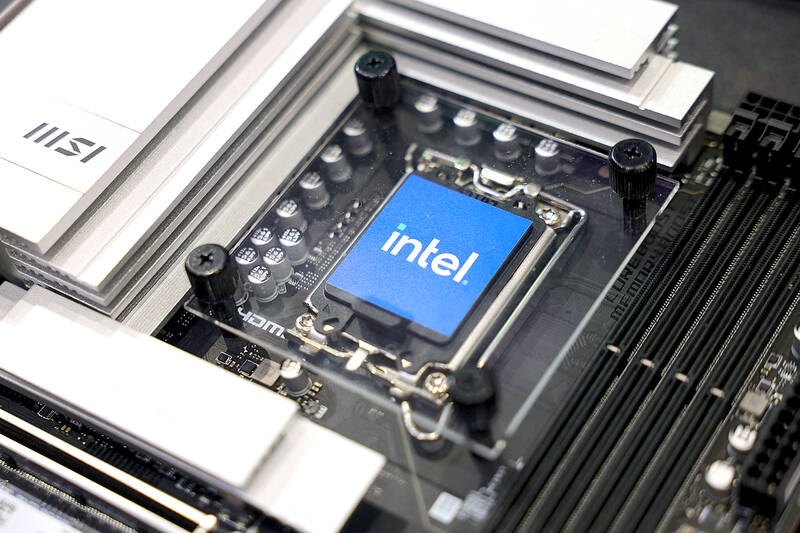Intel Corp is to spin off assets that are not central to its mission and create new products including custom semiconductors to try to better align itself with customers,
chief executive officer Lip-Bu Tan (陳立武) said on Monday.
The US chipmaker needs to replace the engineering talent it has lost, improve its balance sheet and better attune manufacturing processes to meet the needs of potential customers, Tan said.

Photo: I-Hwa Cheng, AFP
Speaking at his first public appearance as CEO, at the Intel Vision conference in Las Vegas, Tan did not specify what parts of Intel he believes are no longer central to its future.
“We have a lot of hard work ahead,” he said, addressing the company’s customers in the audience. “There are areas where we’ve fallen short of your expectations.”
The veteran semiconductor executive is trying to restore the fortunes of a company that dominated an industry for decades, but now finds itself chasing rivals in most of the areas that define success in the field. A key question confronting its leadership is whether a turnaround is best served by the company remaining whole or splitting up its key product and manufacturing operations.
Tan gave no indication that he would seek to divest either part of Intel. Instead, he highlighted the problems he needs to fix to get both units performing more successfully.
Intel’s chips for data center and artificial intelligence (AI)-related work in particular are not good enough, he said.
“We fell behind on innovation,” he said. “We have been too slow to adapt and meet your needs.”
Tan, 65, assumed the role on March 18. He had been an Intel board member before stepping down in August last year.
The CEO said he has been asked why he took on the job this late in his career.
“It was very hard for me to see it struggle,” Tan said. “I simply could not stay on the sidelines knowing that I could help.”
Tan’s predecessor, Pat Gelsinger, was pushed out by the board for a perceived failure to rejuvenate Intel’s product lineup. One of the most glaring challenges: creating an AI accelerator chip to rival the products of Nvidia Corp. That company, once in Intel’s shadow, has seen its revenue and valuation skyrocket over the past two years due to the AI computing boom.
Gelsinger had also set out to turn Intel into a chip foundry — a contract manufacturer that makes products for outside clients — but that effort is still in its early stages.
Tan said the company needs to listen to prospective outside customers for its factories and let them specify the design and manufacture of their products, rather than Intel dictating the way it would be done.
He said many large customers want custom parts — and his company will do it for them.
The CEO repeatedly emphasized that there is no quick fix to Intel’s problems, but that he is committed to staying at the company as long as it takes.
“It won’t happen overnight, but I know we can get there,” he said.

MULTIFACETED: A task force has analyzed possible scenarios and created responses to assist domestic industries in dealing with US tariffs, the economics minister said The Executive Yuan is tomorrow to announce countermeasures to US President Donald Trump’s planned reciprocal tariffs, although the details of the plan would not be made public until Monday next week, Minister of Economic Affairs J.W. Kuo (郭智輝) said yesterday. The Cabinet established an economic and trade task force in November last year to deal with US trade and tariff related issues, Kuo told reporters outside the legislature in Taipei. The task force has been analyzing and evaluating all kinds of scenarios to identify suitable responses and determine how best to assist domestic industries in managing the effects of Trump’s tariffs, he

TIGHT-LIPPED: UMC said it had no merger plans at the moment, after Nikkei Asia reported that the firm and GlobalFoundries were considering restarting merger talks United Microelectronics Corp (UMC, 聯電), the world’s No. 4 contract chipmaker, yesterday launched a new US$5 billion 12-inch chip factory in Singapore as part of its latest effort to diversify its manufacturing footprint amid growing geopolitical risks. The new factory, adjacent to UMC’s existing Singapore fab in the Pasir Res Wafer Fab Park, is scheduled to enter volume production next year, utilizing mature 22-nanometer and 28-nanometer process technologies, UMC said in a statement. The company plans to invest US$5 billion during the first phase of the new fab, which would have an installed capacity of 30,000 12-inch wafers per month, it said. The

Taiwan’s official purchasing managers’ index (PMI) last month rose 0.2 percentage points to 54.2, in a second consecutive month of expansion, thanks to front-loading demand intended to avoid potential US tariff hikes, the Chung-Hua Institution for Economic Research (CIER, 中華經濟研究院) said yesterday. While short-term demand appeared robust, uncertainties rose due to US President Donald Trump’s unpredictable trade policy, CIER president Lien Hsien-ming (連賢明) told a news conference in Taipei. Taiwan’s economy this year would be characterized by high-level fluctuations and the volatility would be wilder than most expect, Lien said Demand for electronics, particularly semiconductors, continues to benefit from US technology giants’ effort

‘SWASTICAR’: Tesla CEO Elon Musk’s close association with Donald Trump has prompted opponents to brand him a ‘Nazi’ and resulted in a dramatic drop in sales Demonstrators descended on Tesla Inc dealerships across the US, and in Europe and Canada on Saturday to protest company chief Elon Musk, who has amassed extraordinary power as a top adviser to US President Donald Trump. Waving signs with messages such as “Musk is stealing our money” and “Reclaim our country,” the protests largely took place peacefully following fiery episodes of vandalism on Tesla vehicles, dealerships and other facilities in recent weeks that US officials have denounced as terrorism. Hundreds rallied on Saturday outside the Tesla dealership in Manhattan. Some blasted Musk, the world’s richest man, while others demanded the shuttering of his